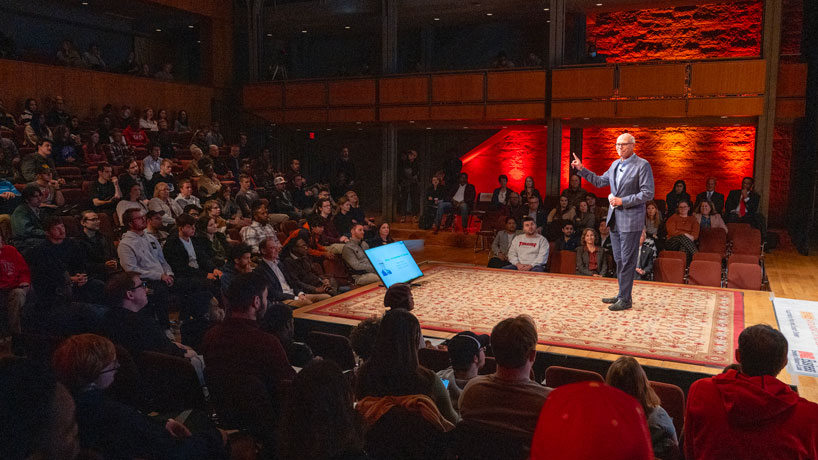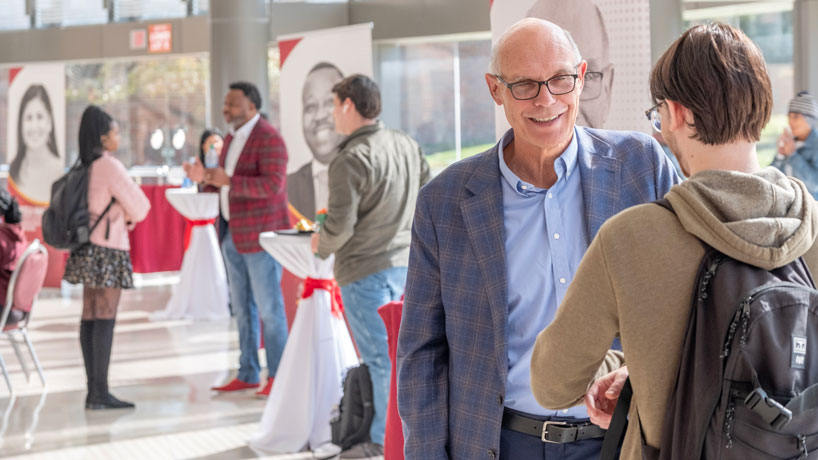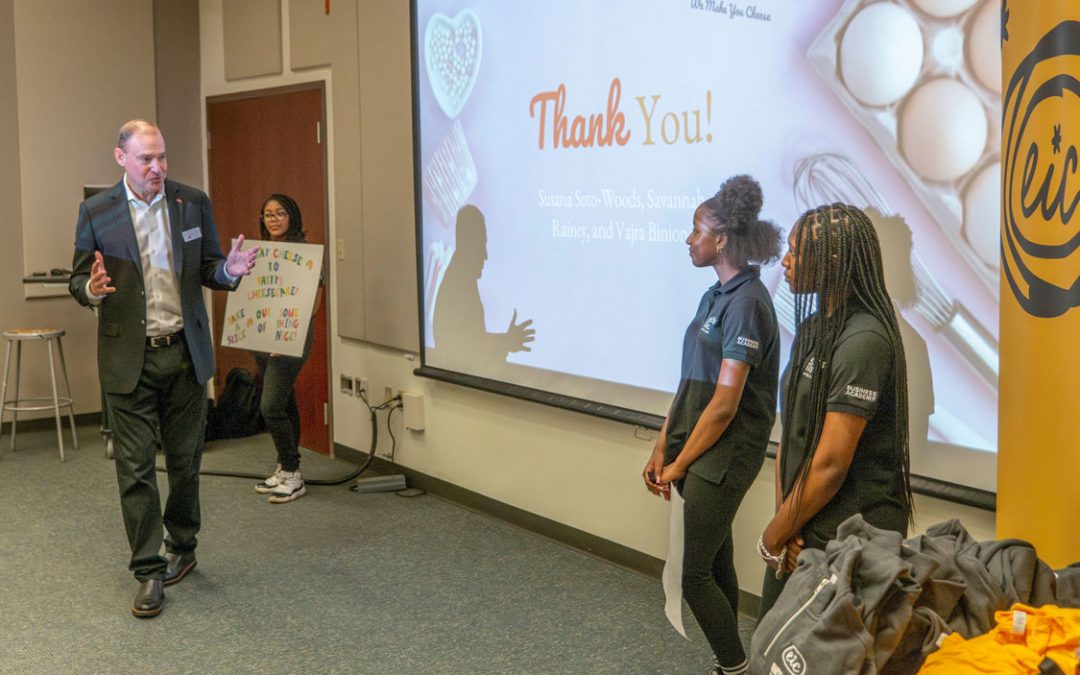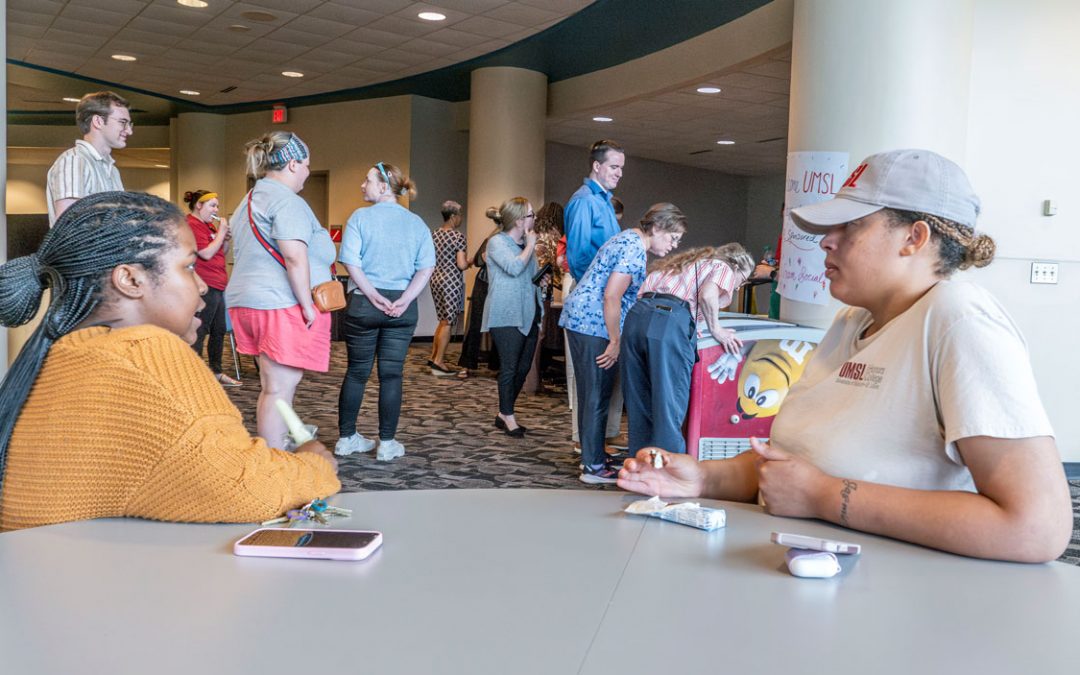
Retiring Ameren Executive Chairman Warner Baxter delivers a TEDx-style talk about the importance of ethics last Tuesday morning in the E. Desmond and Mary Ann Lee Theater. (Photos by Derik Holtmann)
The day before he was set to retire as executive chairman of Ameren, University of Missouri–St. Louis alum Warner Baxter returned to the place he credits with helping launch his career.
He was the featured speaker in the latest installment of “Ethics: A Foundation for Success,” the six-part alumni conversations series started last fall by fellow graduate Joseph Stieven and his wife, Mary, in collaboration with UMSL’s College of Business Administration and University Advancement.
Addressing an audience of more than 215 people – the majority of them students – in a TEDx-style talk Tuesday morning in the E. Desmond and Mary Ann Lee Theater in the Blanche M. Touhill Performing Arts Center, Baxter had a chance to share some wisdom he’s acquired during 40 years working in business, the past 28 at Ameren, including 13 years as its president and CEO.
Warner Baxter talks to an UMSL student in the Terrace Lobby after his TEDx-style talk about ethics last Tuesday. Students had the opportunity to ask questions of Baxter and other members of the alumni conversations cohort: Stieven, the president of Stieven Capital Advisors; Marcela Manjarrez, a former executive vice president and chief communications officer at Centene; Sandra Van Trease, a former group president at BJC HealthCare; and Orv Kimbrough, the chairman and CEO of Midwest BankCentre.
“This is not a lecture,” Baxter said. “If you came here to get a lecture from me, you will be disappointed because I’m not qualified for that. I am qualified to share perspectives and experiences, and that’s really what I want to do today.”
Baxter began by giving students some highlights from his personal journey. Born in St. Louis and raised not far from Lambert International Airport, he graduated from Ritenour High School and was the first member of his family to attend college when he decided to enroll at UMSL.
At the time, Baxter did not know what direction he wanted his career to go. He wound up majoring in accounting and, after earning his bachelor’s degree in 1983, he secured a job at PwC and started out in auditing. After 12 years with the company, he moved to the energy industry as the vice president and controller at what was then still known as Union Electric.
Baxter continued to climb the company’s ranks, first becoming president and CEO in 2009 and adding the role of chairman in 2014. He’s also made an impact on numerous civic and charitable boards.
“Warner has characteristics that remind me of Elliot Stein,” Stieven said, referring to the late Stifel executive who was Stieven’s mentor and the inspiration for the series. “He’s kind, he’s open, he’s inclusive, he’s super smart, he’s wise. When Warner enters a room, he’s quiet, somewhat unassuming. He doesn’t stomp his feet to get noticed. He sort of glides, like Elliot. That’s how Elliot was. This is sincerely the highest compliment that I could give someone.”
Baxter described the importance of ethics underpinning all his success throughout his career.
“If you do not practice ethical behavior, you simply don’t have trust,” Baxter said. “You can be the brightest person in the room. You can be this incredible orator. You can be all things in a lot of different ways, but if you’re not ethical, you’ll never be a leader because people will not follow people they don’t trust. It is the foundation.”
He stressed that that’s not only true in the business world but in most other roles in life.
Baxter shared some definitions of ethics, including one from Webster’s Dictionary, which describes it as “the discipline dealing with what is good and bad and with moral duty and obligation.”
“I never thought about ethics being a discipline,” Baxter said. “I reflected on it. So why would it be a discipline? When I thought about it, it made sense. It reminded me of what Joe Stieven said last year about complex problems – Joe said you try to break them down into smaller pieces or parts and try to understand the issue. You have to have this discipline to think about it thoughtfully. That’s what the discipline is about in ethics, because when it comes to ethical things, some folks think it’s black and white, right and wrong. But it isn’t always so simple.”
Baxter described one ethical dilemma Ameren faced early in the COVID-19 pandemic as the world shut down and people were laid off from their jobs. He knew many of their customers were going to be challenged to pay their bills amid the period of economic turmoil.
Ameren and other utilities are empowered to discontinue service when customers miss payments, but they knew that adhering to their policies could lead to significant financial pain. At the same time, abandoning the policy would allow some people to game the system and avoid payments, hurting the company’s cash flows and limiting the resources available to invest in growing and improving their infrastructure.
“At the time, I had the great fortune of playing a leadership role in our industry,” Baxter said. “We brought the CEOs from literally all the Ameren-type of companies around the country together, and we talked about this. We have this discipline of conversations, and we are at this moment in time that we’ve never experienced. We have the legal right, the legal right, if people do not pay their bills to disconnect. … What are we going to do? I’ll tell you what we chose to do: the right thing.”
They discontinued the policy for more than a year to help their customers weather the trying times. Baxter admits it wasn’t an easy decision, but he knows it was the right one and the ethical one.
At the end of Tuesday’s talk, students had the opportunity to ask questions of Baxter and other members of the alumni conversations cohort: Stieven, the president of Stieven Capital Advisors; Marcela Manjarrez, a former executive vice president and chief communications officer at Centene; Sandra Van Trease, a former group president at BJC HealthCare; and Orv Kimbrough, the chairman and CEO of Midwest BankCentre.
Van Trease will be the featured speaker in the next installment of the series in April.















